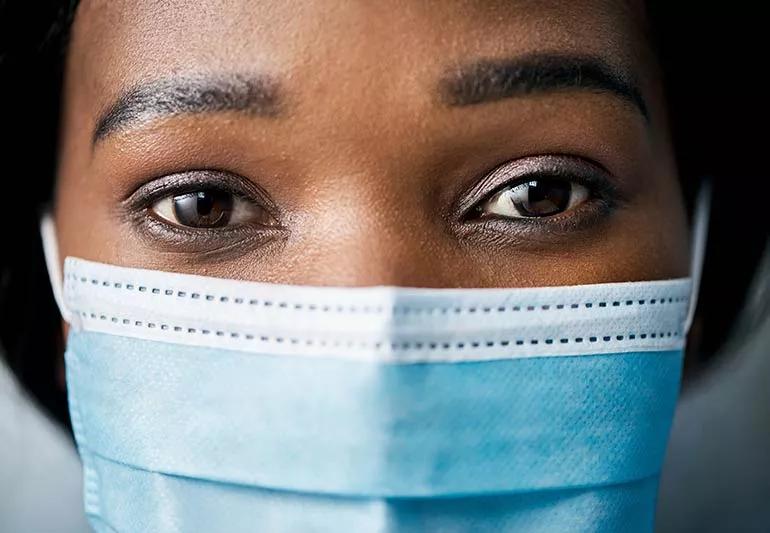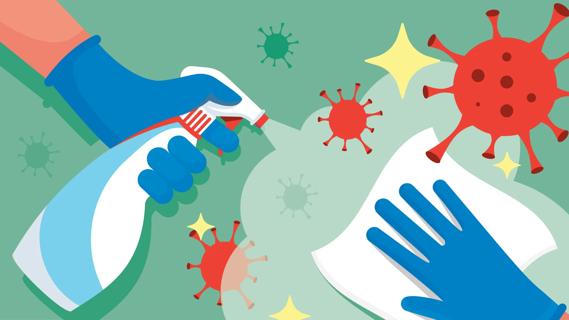Advertisement
Cases of infections are skyrocketing across the U.S.

With cases of COVID-19 rising in parts of the country, it can be frustrating and scary to still be dealing with the pandemic after almost two years.
Advertisement
Cleveland Clinic is a non-profit academic medical center. Advertising on our site helps support our mission. We do not endorse non-Cleveland Clinic products or services. Policy
But as new variants like delta and omicron become the dominant strains in the United States, it remains important for all of us to do our part to keep ourselves and each other safe.
Even if you’re vaccinated, received your booster and have been practicing social distancing, now is not the time to let your guard down.
Pulmonologist and intensivist Eduardo Mireles-Cabodevila, MD, talks about why we’re still in the middle of a pandemic and what we can do to stay safe.
“We need to keep our guard up because what we’re seeing right now has been caused by relaxed social distancing,” says Dr. Mireles-Cabodevila.
Throughout the last two years, tools like at-home COVID-19 testing kits and vaccines have helped us manage the COVID-19 virus.
At times, the number of cases of COVID-19 infections has decreased, but not enough for the World Health Organization (WHO) to declare the pandemic over.
“There’s moments in which the numbers go down and it allows hospitals to be able to manage and take care of patients in the ICU,” says Dr. Mireles-Cabodevila. “It allows people to have a social life and do business as usual. But right now, we’re not there.”
A pandemic is when a disease’s growth rate skyrockets, with more cases each day than the last.
Advertisement
We won’t enter an endemic, a phase when a disease is limited to a particular region, until the rates and spread are predictable.
Even with vaccines and boosters available, many hospital systems across the country are seeing high numbers of patients in their intensive care units (ICUs), with the majority of them unvaccinated.
The best way to protect yourself and others is to get vaccinated. If you’re due for your booster shot, have been undecided about getting your child vaccinated or have been weary all along about getting a vaccine, the science is clear: Vaccines save lives.
“We need the vaccine to go into the arms of people so that we’re able to protect them for the future,” says Dr. Mireles-Cabodevila. “That way, they can get back into real life and we can stop the spread of this virus.”
We understand; it’s been tough dealing with social distancing, canceling events and not seeing loved ones over the last two years. But even if you’ve been doing everything right, stay the course.
“If you’re vaccinated and you come in contact with the virus, you may not get ill, but you can spread it,” says Dr. Mireles-Cabodevila. “Then, if you’re in contact with somebody who is vulnerable, you have a situation in which you have caused harm to somebody else.”
So it’s important to keep doing the following:
Variants like delta and omicron have been making headlines lately. Viruses like COVID-19 adapt and mutate over time, leading to a variant that could be stronger and can spread faster.
“The virus that we’re seeing right now is not the same virus that we saw in February 2020,” says Dr. Mireles-Cabodevila. “The new variants that are coming out seem to be more contagious than the others, so they spread really rapidly.”
Omicron, the latest variant, seems to spread faster. If you’re vaccinated and get infected with a breakthrough case of COVID-19, these new strains may only result in minor symptoms and many people can recover rather quickly.
“However, the sheer number of people who get the disease increases the amount of people who get severe disease. That’s when it starts overwhelming the healthcare system,” says Dr. Mireles-Cabodevila.
Vaccines protect you against severe disease. Getting a booster increases immune response and reminds your body of how to fight COVID-19 and its variants.
Even if new variants appear, having a defense system activated by vaccines will have you covered better than not being vaccinated at all.
Advertisement
And there may yet be more variants of COVID-19 — unless we all take the pandemic seriously.
“The number of variants that we will see in the future depends on our actions of today,” says Dr. Mireles-Cabodevila. “Every time that the virus infects somebody, it has a chance to mutate. Vaccination is best. The less it spreads, the less chance it has to mutate.”
So, thinking you might have been exposed or infected with COVID-19? First, make sure you wear a mask and separate yourself from family, friends and co-workers.
Next, get tested. Although many people have had trouble finding at-home COVID-19 rapid test kits lately due to supply shortages, tests may be available to buy at drug stores and pharmacies or obtained for free at your local library. President Biden has also promised to purchase 500 million at-home COVID-19 rapid tests, which will be distributed for free to Americans who want them starting in early 2022.
Don’t go to the emergency room for a test, though. ERs across the country are currently overwhelmed and have people waiting to get into the hospital for care.
But if you’re experiencing the following, head to the nearest emergency room or call 911.
Advertisement
“COVID-19 has no preference. It goes after people of any race, any gender, any age,” says Dr. Mireles-Cabodevila. “We have to protect our communities and our families by doing the responsible thing. Wear a mask and vaccinate yourself because you can help tremendously in controlling the pandemic.”
Advertisement
Learn more about our editorial process.
Advertisement

Studies have shown an increase in ophthalmic complications as a symptom of COVID-19

Most people can return to work and regular life when they’re symptom-free for 24 hours

Lysol Disinfecting Wipes are just one of more than 500 products approved by the EPA for protection against the SARS-CoV-2 virus that causes COVID-19

Infections, autoimmune conditions, major life changes, extreme temps and even sunlight can cause this itchy condition

Keep the area clean and monitor your incision site for discharge, odor or a change in appearance

The medication is ineffective and — in the case of animal ivermectin — potentially dangerous

You can reduce your risk by not swallowing water, and showering before and after swimming

Updated vaccinations are recommended to better protect against the evolving virus

Focus on your body’s metabolic set point by eating healthy foods, making exercise a part of your routine and reducing stress

PFAS chemicals may make life easier — but they aren’t always so easy on the human body

While there’s little risk in trying this hair care treatment, there isn’t much science to back up the claims